RRB JE Mock Test 2026
The Railway Recruitment Board Junior Engineer exam requires consistent practice under real exam conditions. And the RRB JE mock test can play an important role in shaping your success. At Mockers, we understand your needs and offer this high-quality resource completely free so that you can prepare smartly as well as effectively.
Moreover, our RRB JE mock test 2026 simulates the actual CBT (computer-based test) pattern. It helps you get comfortable with the interface of the exam while improving your speed and accuracy. On our platform, you also receive instant analysis that includes section-wise scores, correct answers, and detailed explanations for all the questions. With this, you can notice your weaker areas and work on them in a strategic way.
Overview Of The RRB JE Examination
You can find more information about this examination with the help of the table below.
| ASPECT | DETAILS |
| Name of the Examination | RRB JE: Railway Recruitment Board Junior Engineer Exam |
| Exam Conducting Authority | RRB: Railway Recruitment Board |
| Level of the Examination | National level |
| Stages in the Examination | Four stages
|
| Salary Offered |
|
| Age Limit | 18 to 36 years (as on 1st January of the specific year). |
| Official website | Indian Railway Board |
Bilingual RRB JE Mock Test 2026 Series
In order to make your preparation much easier and effective, we give the RRB JE mock test free in a series form. This means that you can attempt 5 full-length tests and practice around 500 questions with a single resource. Furthermore, each of these tests can be attempted in English as well as the Hindi language. You also get the benefit of changing the language of the question in the middle of your test attempt. You can find the links to the mock test series below.
RRB JE Mock Test Free Comes With Accurate Solutions
Each question in our RRB JE mock test CBT 1 is solved and analyzed by our subject-matter experts. Then, they provide the correct solution as well as a detailed explanation for it. This is done so that you can understand your level of conceptual knowledge and note down your mistakes. Afterwards, you can make the required changes in your preparation strategy and give more time to working on these errors. You need to know that all these solutions will only be available after submitting the test on Mockers.
Why Practicing RRB JE Mock Test CBT 1 Is Smarter Than Just Studying?
It is a well-known fact that in today’s competitive environment of exams, only studying is no longer enough. After learning the syllabus, it is necessary that you apply that knowledge under exam conditions. That’s where our RRB JEE free mock test as well as sample paper, comes in. We have mentioned some more points in detail below regarding this.
- Reading books or watching lectures is considered to be a passive activity. In this, your brain just receives information but does not process or apply it in real time. On the other hand, attempts at the RRB JE mock test CBT 1 free are an active recall. You have to retrieve, apply, as well as make decisions under time pressure. This process strengthens your memory for the long term.
- It is one thing to know an answer, and recalling it under pressure is totally different. With the help of the RRB JE mock test online free, you are able to simulate that mental pressure, which further reduces your anxiety. So, by the exam day arrives, you are already comfortable in that environment.
- When you just read notes or watch solved problems, it creates a false sense of confidence. And solving the RRB JE free online mock test series breaks that illusion. Its result highlights the topics where you are underperforming or spending too much time, clearly.
- With the RRB JE mock test, you get measurable progress. This means that you can track how your accuracy improves week by week, which sections are stable, how close you are to your target cut-off, and so on. This progress boosts your confidence as well as motivates you to stay consistent in your exam preparation.
Guide To Attempt The RRB JEE Free Mock Test On Our Platform
By following the steps below one by one, you will be able to access and take the RRB JE mock test free on Mockers.
- The first step includes reaching the homepage of our website. For this, you can simply type www.mockers.in on any browser.
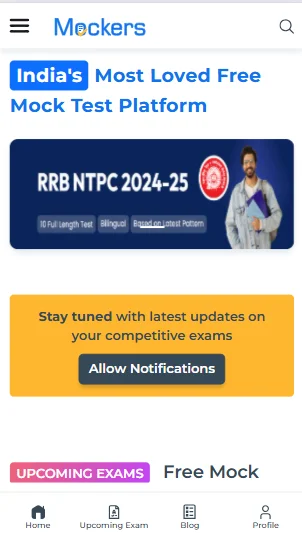
- Once there, you can click on the ‘Navigation’ tab and select the ‘Exam Categories’ section from the main menu.
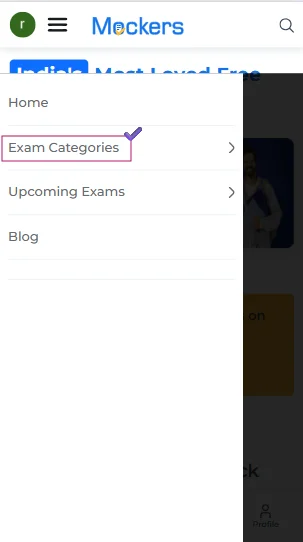
- Now, you can have a look at various categories and then tap on the ‘Railway’ option.
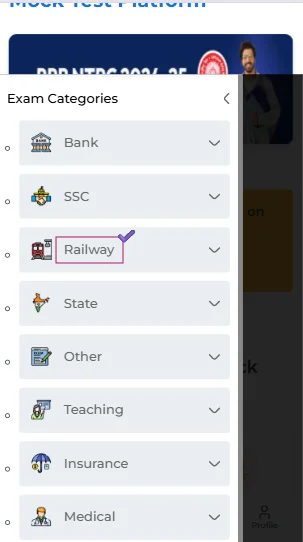
- This option will open a list of different railway exams. Here, you need to click on the ‘RRB JEE’ icon.
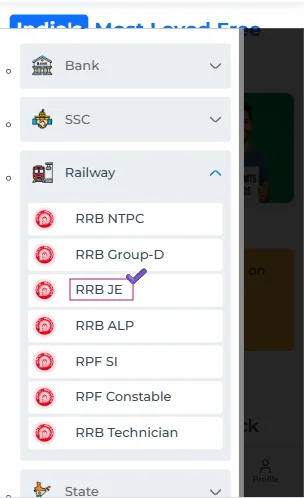
- Then, the page for the RRB JE mock test 2026 will load, where you have to tap on the ‘Explore’ button.
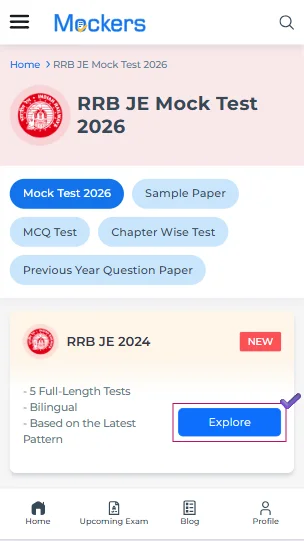
- You can go through the series of our RRB JE mock test CBT 1 and click on the ‘Start’ icon of the one that you wish to attempt.

- Finally, you must read all the given instructions carefully for a successful attempt at the RRB JEE free mock test.
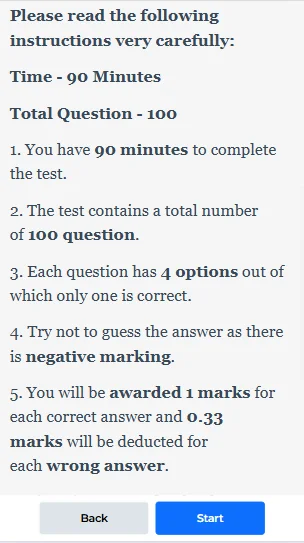
RRB JE Recruitment Process
Below are the details related to all the stages of this examination. You should go through it to understand the exam more clearly.
- Only online applications should be submitted by candidates via the official RRB websites. Candidates can apply to only one RRB and only one common online application (in order of preference for any or all the notified positions). Once exercised, the RRB selection will be final. If a candidate applies to more than one RRB, all of their applications will be rejected.
- Eligible candidates will get information about the exam schedule and locations in due course through RRB websites, emails, or SMS.
- Under no circumstances will requests to postpone any of the phases or to alter the location, date, or shift be considered.
1st Stage CBT
90 minutes in length (120 minutes for qualified PwBD candidates with Scribe). There are 100 questions.
- The purpose of the first stage of CBT is screening, and the questions will typically be in line with the minimal technical requirements and/or educational standards required for the positions.
- Candidates will only be shortlisted for the second stage exam based on their merits using the normalized score from the first stage exam. Candidates who receive the reservation benefits of a community, PwBD, or ExSM and are shortlisted for the second stage of the CBT will only be evaluated against that community in all ensuing recruitment stages.
- The questions will be multiple-choice and objective in nature, and they will probably ask about:
- Mathematics: Number systems, BODMAS, Decimals, Fractions, LCM and HCF, Ratio and Proportion, Percentages, Mensuration, Time and Work, Time and Distance, Simple and Compound Interest, Profit and Loss, Algebra, Geometry, Trigonometry, Elementary Statistics, Square Root, Age Calculations, Calendar and Clock, Pipes and Cistern.
- General Intelligence and Reasoning: Analogies, Alphabetical and Number Series, Coding and Decoding, Mathematical operations, Relationships, Syllogism, Jumbling, Venn Diagram, Data Interpretation and Sufficiency, Conclusions and Decision Making, Similarities and Differences, Analytical reasoning, Classification, Directions, Statement – Arguments and Assumptions, etc.
- General Awareness: Knowledge of Current affairs, Indian geography, culture, and history of India, including the freedom struggle, Indian Polity and constitution, Indian Economy, Environmental issues concerning India and the World, Sports, General Scientific and technological developments, etc.
- General Science: Physics, Chemistry, and Life Sciences (up to 10th Standard CBSE syllabus).
You can check out the table below for a section-wise number of questions and marks.
| Subjects | No. of Questions | Marks for Each Section |
| Mathematics |
30 |
30 |
| General Intelligence and Reasoning | 25 | 25 |
| General Awareness | 15 | 15 |
| General Science | 30 | 30 |
| Total | 100 | 100 |
| Negative Marking: -1/3rd mark of the allotted mark for every wrong answer. | ||
- There may be some differences in the actual question papers from the section-by-section distribution shown in the above table.
- Minimum percentage of marks required for eligibility in the following categories: ST -25%, OBC 30%, SC 30%, EWS 40%, and UR 40%. If there are not enough PwBD candidates to fill the vacancies set aside for them, the eligibility mark percentage may be lowered by 2% for PwBD candidates.
2nd Stage CBT
Candidates will be selected for the 2nd Stage CBT exam based on their normalized scores from the 1st Stage CBT exam. According to their merit in the first stage of the CBT, a total of 15 times the community-wise total number of vacancies for posts notified against the RRB will be shortlisted for the second stage.
- However, in order to guarantee that there are enough applicants for all of the advertised positions, Railways retains the right to raise or lower this cap overall or for any one category as needed.
- 120 minutes in length (160 minutes for qualified PwBD candidates with Scribe). There are 150 questions.
- Syllabus: The objective, multiple-choice questions will probably cover topics such as general awareness, physics and chemistry, computer fundamentals and applications, environmental and pollution control fundamentals, and technical skills relevant to the position. All notified positions under this CEN follow the same general awareness, physics and chemistry, computer and application fundamentals, environmental fundamentals, and pollution control syllabus, which is described below:
-
- General Awareness: Knowledge of Current affairs, Indian geography, culture, and history of India, including the freedom struggle, Indian Polity and Constitution, Indian Economy, Environmental issues concerning India and the World, Sports, General Scientific and Technological Developments, etc.
- Physics and Chemistry: Up to the 10th standard CBSE syllabus.
- Basics of Computers and Applications: Architecture of Computers; input and Output devices; Storage devices, Networking, Operating systems, like Windows, Unix, Linux; MS Office; Various data representation; Internet and Email; Websites and Web Browsers; Computer Virus.
- Basics of Environment and Pollution Control: Basics of Environment; Adverse effects of environmental pollution and control strategies; Air, water, and Noise pollution, their effect and control; Waste Management, Global warming; Acid rain; Ozone depletion.
- Technical Abilities: Questions on the Technical abilities will be framed in the syllabus defined for various Exam Groups.
The section-wise number of questions and marks is as follows:
| Subjects | No. of Questions | Marks for Each Section |
| General Awareness | 15 | 15 |
| Physics and Chemistry | 15 | 15 |
| Basics of Computer Applications | 10 | 10 |
| Basics of Environment and Pollution Control | 10 | 10 |
| Technical Abilities | 100 | 100 |
| Total | 150 | 150 |
| Negative Marking: -1/3rd mark of the allotted mark for each wrong answer. | ||
- There may be some differences in the actual question papers from the section-by-section distribution shown in the above table.
- The minimum percentage of marks required to be eligible in each of the following categories: UR: 40%, EWS: 40%, OBC: 30%, SC: 30%, and ST: 25%. In the event that there are fewer PwBD candidates than there are slots designated for them, this eligibility mark percentage may be lowered by 2% for PwBD candidates.
- During second-stage CBT, a virtual calculator will be displayed on the computer monitor.
Discipline Mapping Table
Below is the table for the discipline mapping in this examination.
| S. No. | Three-year Diploma in Engineering or a Bachelor's degree in Engineering/Technology | Exam Group |
| Mechanical Engineering | Mechanical and Allied Engineering |
|
| Production Engineering | ||
| Automobile Engineering | ||
| Manufacturing Engineering | ||
| Mechatronics Engineering | ||
| Industrial Engineering | ||
| Machining Engineering | ||
| Tools and Machining Engineering | ||
| Tools and Die Making Engineering | ||
| A combination of any sub-stream of the basic streams of the above disciplines | ||
| Electrical Engineering | Electrical and Allied Engineering | |
| A combination of any sub-stream of the basic streams of Electrical Engineering | ||
| Electronics Engineering | Electronics and Allied Engineering |
|
| Instrumentation and Control Engineering | ||
| Communication Engineering | ||
| Computer Science and Engineering | ||
| Computer Engineering | ||
| Computer Science | ||
| Information Technology | ||
| A combination of sub-streams of the basic streams of the above disciplines | ||
| Civil Engineering | Civil and Allied Engineering |
|
| A combination of any sub-stream of the basic streams of Civil Engineering | ||
| B.Sc. in Civil Engineering for a duration of 3 years |
Syllabus For The Technical Abilities
In this section, we have described the syllabus for different engineering disciplines that come under the technical abilities.
| EXAM GROUP | SUBJECTS |
| Syllabus for Civil and Allied Engineering Exam Group– JE | Engineering mechanics, building construction, building materials, construction of substructure, construction of superstructure, building finishes, building maintenance, building drawing, concrete technology, surveying, computer-aided design, geo-technical engineering, hydraulics, irrigation engineering, mechanics of structures, theory of structures, design of concrete structures, transportation engineering, highway engineering, environmental engineering, advanced construction techniques and equipment, estimating and costing, contracts and accounts |
| Syllabus for Electrical and Allied Engineering Exam Group– JE | Basic concepts, circuit law, magnetic circuit, AC fundamentals, measurement and measuring instruments, electrical machines, synchronous machines, generation, transmission, and distribution, estimation and costing, utilization of electrical energy, and basic electronics |
| Syllabus for Electronics and Allied Engineering Exam Group– JE | Electronic components and materials, electronic devices and circuits, digital electronics, linear integrated circuits, microprocessor and microcontroller, electronic measurements, communication engineering, data communication and network, computer programming, basic electrical engineering |
| Syllabus for Mechanical and Allied Engineering Exam Group– JE | Engineering mechanics, material science, strength of materials, machining, welding, grinding and finishing process, metrology, fluid mechanics and hydraulic machinery, industrial management, thermal engineering |
Document Verification
Based on their performance and merit in the second round of the CBT and choices, candidates will be selected for Document Verification.
- The number of shortlisted applicants will match the number of open positions.
- If two or more applicants receive identical scores, their merit standing will be decided by age; that is, the older applicant will be given higher merit scores than the younger applicant.
- The Railway Administration's Medical Fitness Test must be passed by the chosen applicants before they can be appointed. Additionally, all necessary documentation must be finalized, and the candidates' backgrounds and character must be checked.
When And How To Use Mockers’ RRB JE Mock Test CBT 1 Free?
The RRB JE free online mock test series is a powerful instrument with which you can shape your preparation strategy, build exam stamina, and fine-tune your performance. In the table below, we have described some points on when and how to utilize this resource for outstanding results.
| Preparation Stage | When to Start | How to Use | Pro Tips |
| Foundation Stage (Just started preparing) | After 2–3 weeks of basic study |
|
|
| Concept-Building Phase (Studying core subjects and syllabus) | 1 mock every 5–7 days |
|
|
| Mid-Preparation Phase (50–60% syllabus done) | 2 mocks/week |
|
|
| Pre-Revision Stage (Syllabus almost complete) | 3–4 mocks/week |
|
|
| Final Revision Phase (Last 2–3 weeks before exam) | 1 mock every alternate day. |
|
|
| Exam Week | Last RRB JE mock test CBT 1 free 2–3 days before the exam. |
|
|
| Post-Test Analysis (Every Stage) | After each RRB JE mock test online free |
|
|
Conclusion
Attempts at the RRB JE free online mock test series are known as a smart strategy for success in the examination. With this resource, you get real-time experience, which further builds your speed, accuracy, as well as confidence. Also, by assessing your performance in these tests, you will be able to fine-tune your preparation, avoid mistakes that are common, and stay ahead of the competition. In this competitive exam, taking the mock test can make an important difference between just qualifying and truly excelling.
 Bank
Bank







 SSC
SSC









 Railway
Railway







 State
State




 Other
Other


 Teaching
Teaching




 Insurance
Insurance


 Medical
Medical



 Engineering
Engineering




















 Defence
Defence





 GATE
GATE





 NTA CUET
NTA CUET

 UPSC
UPSC

 MBA Entrance
MBA Entrance

















 LAW
LAW

 JEE Main 2026 : Session 1
JEE Main 2026 : Session 1
 SSC MTS 2025
SSC MTS 2025
 IBPS RRB 2025
IBPS RRB 2025
 Railway Group D 2025
Railway Group D 2025
 RRB ALP CBT-I 2025
RRB ALP CBT-I 2025
 CTET 2025 Paper I
CTET 2025 Paper I
 UP Police SI (दरोगा) 2025
UP Police SI (दरोगा) 2025
 SSC CPO Tier I 2025
SSC CPO Tier I 2025
 DSSSB PRT 2025
DSSSB PRT 2025
 Delhi Police Constable 2025
Delhi Police Constable 2025
 SSC CGL Tier-II 2025
SSC CGL Tier-II 2025
 GATE ME 2026
GATE ME 2026
 GATE EE 2026
GATE EE 2026
 GATE EC 2026
GATE EC 2026
 GATE CE 2026
GATE CE 2026
 GATE CS 2026
GATE CS 2026

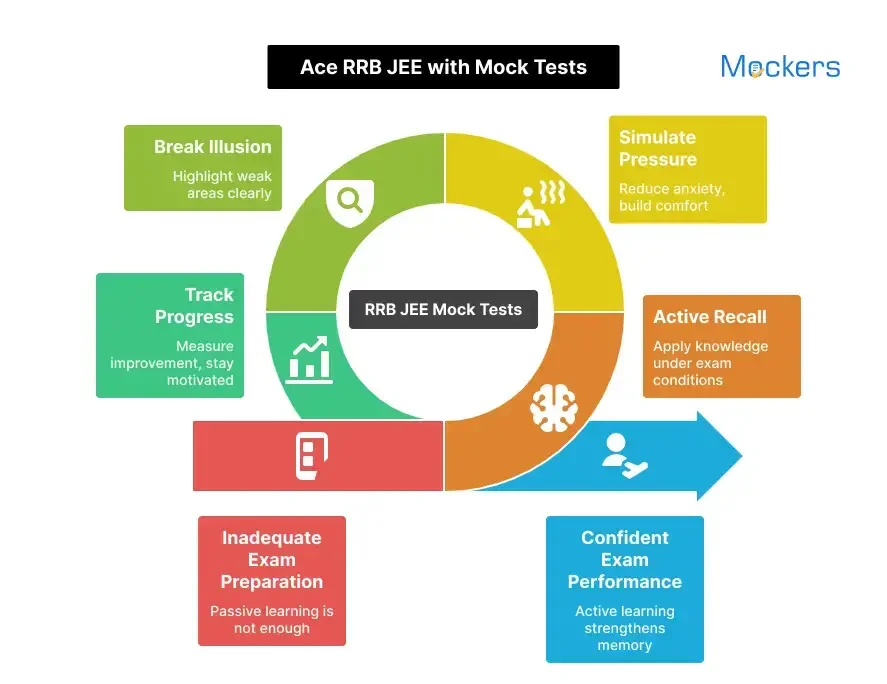












 Get latest Exam Updates
Get latest Exam Updates 



